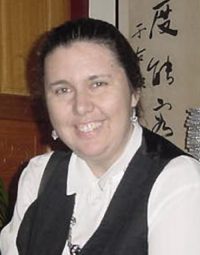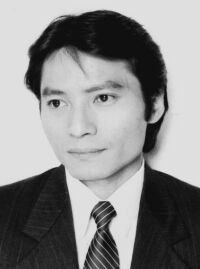Proper way of translating English name into Chinese. Thread poster: Jian Chen
|
|---|
Jian Chen
Local time: 10:17
Chinese to English
+ ...
What is the proper way of translating English name into Chinese. Eg. Peter Chang as 曾彼得, 曾.彼得, 彼得.曾 or 彼得.曾? Emilia Molina as 伊米莉亚.魔莲娜, 伊米莉亚魔莲娜,魔莲娜.伊米莉亚 or 魔莲娜伊米莉亚? Thank you!
| | | |
For people who are public figures and who are Chinese, obviously there is already a standard way to render their names in Chinese. That's something to search on Google or in public records.
For people who are Chinese but who are not public figures, and whose names have been written in English -- that's harder. Many times you end up just making an educated guess as to which character was meant -- assuming that the person uses a standard Romanization system to render his or her name! ... See more For people who are public figures and who are Chinese, obviously there is already a standard way to render their names in Chinese. That's something to search on Google or in public records.
For people who are Chinese but who are not public figures, and whose names have been written in English -- that's harder. Many times you end up just making an educated guess as to which character was meant -- assuming that the person uses a standard Romanization system to render his or her name! If not, then it's really anyone's guess which character was originally there. We get this a lot in Taiwan with people who choose to use their own original Romanization system to render their names in Minnan dialect.
For Westerners, obviously the best-known have standard renderings, which are usually different from Taiwan to the Mainland (again, check the internet or other sources). For average people, I think it is better to translate a Western name into a "normal" three-character Chinese name ONLY if that person speaks Chinese or has some strong connection to Chinese things or people; for a person who knows little or nothing about China, I would usually choose to transliterate the Western name, to emphasize the "group identity" (i.e., not create unreasonable expectations about the person's ability to deal with the Chinese language). Others may feel differently but to me, if a "foreigner" adopts a Chinese name that sounds truly Chinese, it's better if that person can "back it up" by being able to deal with some degree of Chinese.
Just my NT$0.66, your mileage may vary!
Terry ▲ Collapse
| | | | Jian Chen
Local time: 10:17
Chinese to English
+ ...
TOPIC STARTER
I was asking if there a standard way to translate English name into Chinese for both westerner and oversean Chinese. Should the last name go first followed by the first and middle, or the other way around? Should a period (.) be used to separate the first and the last name. I know for oversea Chinese, they follow the last to first approach, but for western it is the opposite. When you have both oversean Chinese and westerners in a same context, how do you translate?
| | | | Chinoise 
Local time: 11:17
English to Chinese
+ ...
| I agree with you two: That depends! | Jul 3, 2003 |
Jian Chen wrote:
I was asking if there a standard way to translate English name into Chinese for both westerner and oversean Chinese. Should the last name go first followed by the first and middle, or the other way around? Should a period (.) be used to separate the first and the last name. I know for oversea Chinese, they follow the last to first approach, but for western it is the opposite. When you have both oversean Chinese and westerners in a same context, how do you translate?
No matter where we are, it is highly recommended to put the family name before the given name as long as the target language is Chinese and the family name sounds "Chinese"; On the other hand, a
separation mark(间隔号) is desired between the family name and the given name if both of them sound "western". For instance:
Peter Chang = 张彼得
Emilia Molina =伊米莉娅·莫莲娜
HTH
| | |
|
|
|
Summit
English to Chinese
+ ...
| of course, it's all depends | Jul 4, 2003 |
What concerns me the most is: who are the readers / audiences
Since you mentioned it's English Name to Chinese translation, I would assumed the readers or audienace should be Chinese.
John F. Kennedy: 约翰. 甘(肯)乃迪
Mao Ze-Dong (Mao Zedong): 毛泽东
i.e.: when booking airline tickets, Chinese name translated into English would be,
Mao, Zedong or
Zedong Mao
in order to distinquish which is the first name or last name.
| | | | Chinoise 
Local time: 11:17
English to Chinese
+ ...
Summit wrote:
John F. Kennedy: 约翰. 甘(肯)乃迪
Mao Ze-Dong (Mao Zedong): 毛泽东
i.e.: when booking airline tickets, Chinese name translated into English would be,
Mao, Zedong or
Zedong Mao
in order to distinquish which is the first name or last name.
Summit's examples happen to hold the same view as what I have expressed above.
| | | | To report site rules violations or get help, contact a site moderator: You can also contact site staff by submitting a support request » Proper way of translating English name into Chinese. | CafeTran Espresso | You've never met a CAT tool this clever!
Translate faster & easier, using a sophisticated CAT tool built by a translator / developer.
Accept jobs from clients who use Trados, MemoQ, Wordfast & major CAT tools.
Download and start using CafeTran Espresso -- for free
Buy now! » |
| | Wordfast Pro | Translation Memory Software for Any Platform
Exclusive discount for ProZ.com users!
Save over 13% when purchasing Wordfast Pro through ProZ.com. Wordfast is the world's #1 provider of platform-independent Translation Memory software. Consistently ranked the most user-friendly and highest value
Buy now! » |
|
| | | | X Sign in to your ProZ.com account... | | | | | |







